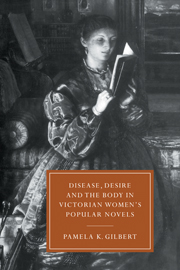Book contents
- Frontmatter
- Contents
- Acknowledgments
- Introduction
- 1 “In the body of the text”: metaphors of reading and the body
- 2 Genre: the social construction of sensation
- 3 M. E. Braddon: sensational realism
- 4 Rhoda Broughton: anything but love
- 5 Ouida: romantic exchange
- Afterword: the other Victorians
- Notes
- Bibliography
- Index
- CAMBRIDGE STUDIES IN NINETEENTH-CENTURY LITERATURE AND CULTURE
4 - Rhoda Broughton: anything but love
Published online by Cambridge University Press: 16 November 2009
- Frontmatter
- Contents
- Acknowledgments
- Introduction
- 1 “In the body of the text”: metaphors of reading and the body
- 2 Genre: the social construction of sensation
- 3 M. E. Braddon: sensational realism
- 4 Rhoda Broughton: anything but love
- 5 Ouida: romantic exchange
- Afterword: the other Victorians
- Notes
- Bibliography
- Index
- CAMBRIDGE STUDIES IN NINETEENTH-CENTURY LITERATURE AND CULTURE
Summary
Rhoda Broughton (1840–1920) produced her twenty-seven novels between the years 1867 and 1920. Her work sold widely and well, and was translated into German, French, Italian, Dutch, Spanish, Danish and Swedish. (For details on editions, see Marilyn Wood's very welcome 1993 literary biography of Broughton.) Initially categorized as a sensation novelist when her first, extremely popular novels came out in the 1860s, she was later classified as a writer of love stories, long after love had ceased to be even arguably the primary theme of her novels. Broughton's focus was always principally on the exposition of character, usually of a woman protagonist. Resolutely a middle-class novelist, Broughton's later novels are social satires with a fairly light, humorous touch. Her technique recalls Jane Austen in that her range of representation is usually narrow, her focus precise – on the manners, fads, and prejudices of the middle classes and in her witty and engaging dialogue. Her attention to the particular difficulties of middle-class women makes available a broader critique of gender and, less frequently, class, but does not insist upon it. Her touch, especially in the later novels is consistently light, her satire Horatian rather than Juvenalian. Plot, in Broughton's novels, has little significance compared to its relative primacy in M. E. Braddon's work; it exists primarily as a unifying structure to hold together a succession of crises, often internal, wherein the protagonist gains insight and maturity. Even in the most comic novels, surprisingly, Broughton rarely offers a conventional happy ending, recalling Shaw's wry observation that when one has learned something, one always feels one has lost something.
- Type
- Chapter
- Information
- Publisher: Cambridge University PressPrint publication year: 1997



